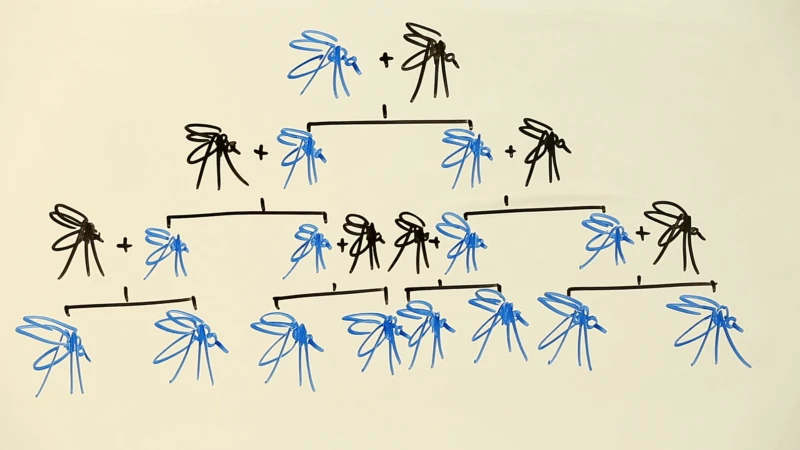CRISPR may help curb malaria by altering a mosquito’s gut genes, new study suggests
CRISPR may help curb malaria by altering a mosquito’s gut genes, new study suggests


The study is the latest in a series of steps toward using CRISPR-Cas9 gene-editing technology to make changes in mosquito genes that could reduce their ability to spread malaria. If further studies support this approach, it could provide a new way to reduce illnesses and deaths caused by malaria.
Mosquito are becoming increasingly resistance to insecticides and malaria parasites are gaining resistance to antimalarial drugs, creating an urgent need for new ways to fight the disease. Gene drives are being tested as a new approach to controlling mosquitoes, locusts and other insects. They work by creating genetically modified mosquitoes that, when released into the environment, mate with wild insects. The offspring contain genes that either reduce mosquito populations or make the insects less likely to spread the malaria parasite. But scientists must prove that this approach is safe and effective before releasing gene drive mosquitoes into the wild.

“Gene drives are promising tools for malaria control,” says first author Astrid Hoermann, research associate at Imperial College London in the United Kingdom. “But we wanted a clear pathway for safely testing such tools in countries where the disease most commonly occurs.”
In the study, Hoermann and colleagues genetically modified the malaria-transmitting mosquito Anopheles gambiae. They used the CRISPR-Cas9 technology to insert a gene that encodes an antimalarial protein amidst genes that are turned on after the mosquito eats a blood meal. The team did this in a manner that allowed the whole section of DNA to also function as a gene drive that could be passed on to most of the mosquitoes’ offspring. They initially inserted the gene along with a fluorescent marker to help them track it in three different spots in the DNA, and then later removed the marker, leaving only a minor genetic modification behind.
Next, the team bred the mosquitoes to see if they were able to successfully reproduce and remain healthy. They also tested how well the malaria parasite developed in the mosquitoes’ guts. Their experiments provide preliminary evidence that this approach to genetic modifications could create successful gene drives.
“These genetic modifications are passive and could be tested in the field and undergo a stringent regulatory process to ensure they are safe and effective in blocking the parasite without raising concerns of accidental spread in the environment,” explains senior author Nikolai Windbichler, senior lecturer at the Department of Life Sciences, Imperial College London. “However, once we combine them with other mosquitoes with an active gene drive, they turn into gene drives themselves without the need for any further changes. Our approach thus brings gene drives one step closer to being tested in the field as a malaria elimination strategy.”
A version of this article was originally posted at the Cornell Alliance for Science and has been reposted here with permission. The Cornell Alliance for Science can be found on Twitter @ScienceAlly

 | Videos | More... |

Video: Nuclear energy will destroy us? Global warming is an existential threat? Chemicals are massacring bees? Donate to the Green Industrial Complex!
 | Bees & Pollinators | More... |

GLP podcast: Science journalism is a mess. Here’s how to fix it

Mosquito massacre: Can we safely tackle malaria with a CRISPR gene drive?

Are we facing an ‘Insect Apocalypse’ caused by ‘intensive, industrial’ farming and agricultural chemicals? The media say yes; Science says ‘no’
 | Infographics | More... |

Infographic: Global regulatory and health research agencies on whether glyphosate causes cancer
 | GMO FAQs | More... |

Why is there controversy over GMO foods but not GMO drugs?

How are GMOs labeled around the world?

How does genetic engineering differ from conventional breeding?
 | GLP Profiles | More... |

Alex Jones: Right-wing conspiracy theorist stokes fear of GMOs, pesticides to sell ‘health supplements’




 Trust issues: What happens when therapists use ChatGPT?
Trust issues: What happens when therapists use ChatGPT? Fighting deforestation with CO2: Biotechnology breakthrough creates sustainable palm oil alternative for cosmetics
Fighting deforestation with CO2: Biotechnology breakthrough creates sustainable palm oil alternative for cosmetics Viewpoint: Video — Big Solar is gobbling up productive agricultural land and hurting farmers yet providing little energy or sustainabilty gains
Viewpoint: Video — Big Solar is gobbling up productive agricultural land and hurting farmers yet providing little energy or sustainabilty gains California, Washington, Oregon forge immunization alliance to safeguard vaccine access against federal undermining
California, Washington, Oregon forge immunization alliance to safeguard vaccine access against federal undermining Viewpoint — Fact checking MAHA mythmakers: How wellness influencers and RFK, Jr. undermine American science and health
Viewpoint — Fact checking MAHA mythmakers: How wellness influencers and RFK, Jr. undermine American science and health 30-year-old tomato line shows genetic resistance to devastating virus
30-year-old tomato line shows genetic resistance to devastating virus The free-range chicken dilemma: Better for birds, but with substantial costs
The free-range chicken dilemma: Better for birds, but with substantial costs ‘You have to treat the brain first’: Rethinking chronic pain with Sanjay Gupta
‘You have to treat the brain first’: Rethinking chronic pain with Sanjay Gupta
